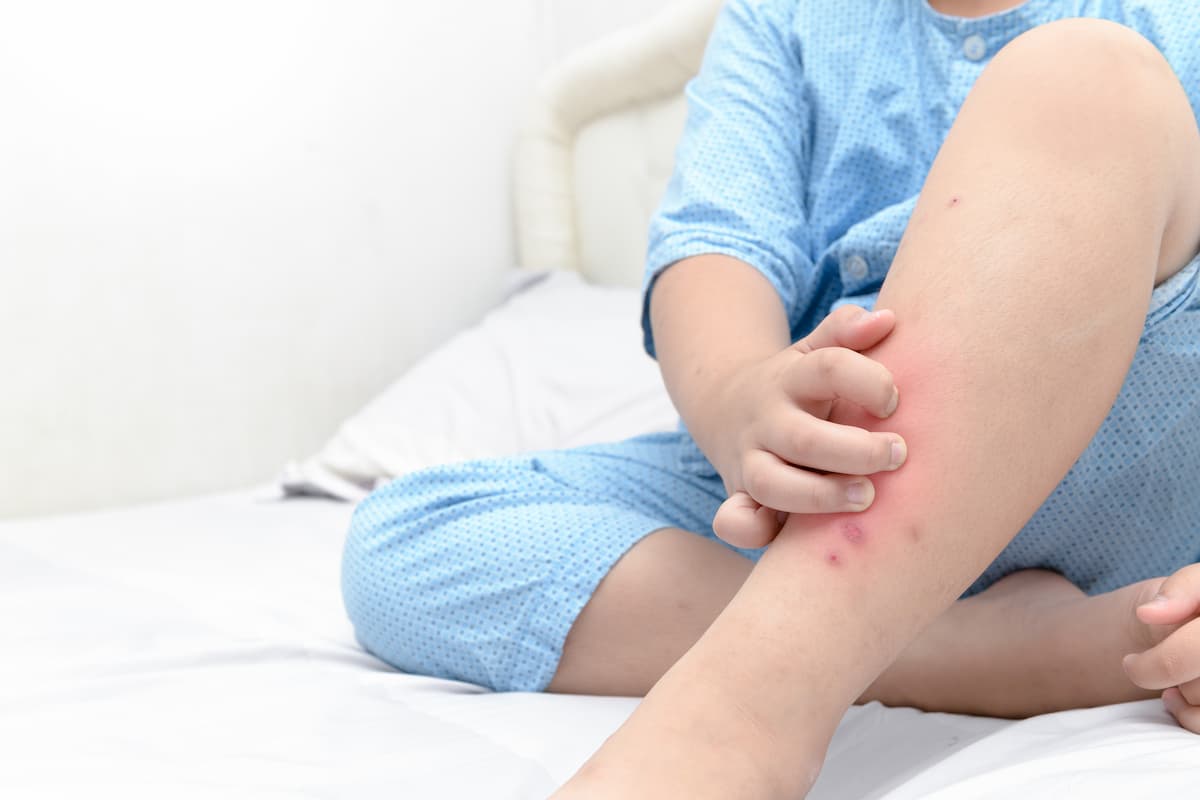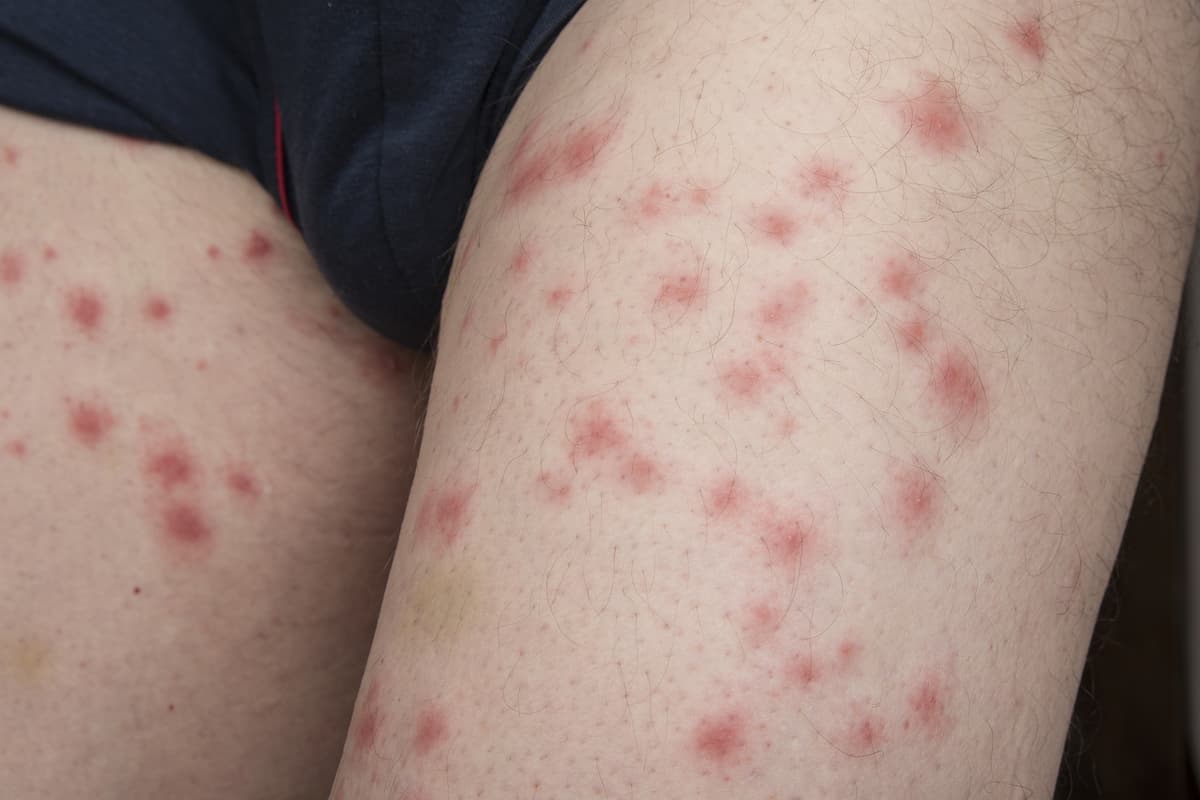Do Bed Bug Bites Spread When Scratched?
Common advice says you shouldn’t scratch bed bug bites, which leads many people to believe this is because the bites will spread.
The truth is that scratching bed bug bites will not cause them to spread. However, you still shouldn’t scratch your bites because scratching can create tears in your skin, which can become infected. Scratching can also lead to scarring.
Why Don’t Bed Bug Bites Spread When You Scratch Them?

Bed bug bites do not spread when you scratch them because they aren’t contagious.
For rashes or sores to spread to other places on your body when you scratch them, they would have to be viral.
But a virus does not cause the itchiness associated with bed bug bites.
It’s the anticoagulant that bed bugs inject into our skin that leads to the skin irritation many people experience from the bites.
Basically, bed bugs release an anticoagulant into our bodies when they bite so that our blood flows more freely.
About 70% of people have negative reactions to this anticoagulant, which can bring about a range of symptoms that most commonly involve itching and swelling.
And because this anticoagulant is no longer on your skin once you start scratching the affected area, you can not spread the irritation caused by the bites to other parts of your body.
Is it Okay to Scratch Bed Bug Bites?
Despite the temptation, it’s best not to scratch bed bug bites.
When you scratch your skin, whether you use your fingernails or something else, you create tears in your skin.
Sometimes these tears are so small you can’t even see them, but you will get them from just about any amount of scratching.
These rips in your skin can allow bacteria to enter your body, which may result in an infection.
How Can I Tell If I Have A Skin Infection?
Some of the most common symptoms of skin infection are:
- Pus leaking from your skin
- A yellow-colored crust over your skin
- A red line or streak around the affected skin
- Swelling or pain that doesn’t go away after a few days
- Fever
- Blister-like sores
- Discolored or painful skin
- Increased itching
If you believe you have a skin infection, you should speak to your doctor for advice about further treatment.
How To Get Bed Bug Bites To Stop Itching

If you have itchy bed bug bites, the first thing you should do is wash the affected skin with soap and water.
Also, make sure you rinse off all of the soap to prevent any additional skin irritation.
If the itching doesn’t stop, you can apply some corticosteroid cream to the bites.
You can buy this type of product at places like Walmart or CVS.
If the itching still doesn’t subside or the affected area becomes painful, you should see a doctor, as they may need to prescribe other medications to soothe your irritated skin.
How Can I Be Sure My Bites Are From Bed Bugs?
Unfortunately, there is no definite way to be sure the bites you have are from bed bugs.
Bed bug bites do not look very different from other insect bites, which can make them hard to identify.
However, there are some ways to determine if the bumps on your skin are from bed bugs as opposed to something else.
Bed Bug Bite Appearance
Typically, bed bug bites are small, and can be either flat or slightly raised.
On darker-skinned people, they usually take on a pink or purple color and may be darker in the center, where the actual bite occurred.
Bed bug bites might also turn dark brown as they fade.
On lighter-skinned people, the bites are usually red or pink and generally have a darker spot in the middle.
In some cases, bed bug bites may become blistered.
Also, if you have a more severe reaction or you scratch the bites a lot, they could swell up to two inches in diameter.
Bed Bug Bite Placement
Bed bug bites tend to appear in a cluster on the body.
This cluster is usually in either a straight line or a zigzag pattern, although the bite pattern can also be random.
Additionally, bed bugs prefer to bite humans on the face, neck, arms, hands, and feet. But they can also bite us in other places too.
Do You Have Signs Of Bed Bugs?
One of the best ways to determine whether the bites you have are from bed bugs is to figure out if you actually have any bed bugs in your home.
If you have bed bugs in your house, they are very likely to bite you.
Here’s a list of the most common signs of bed bugs in your home:
- Bed bugs (The actual insect)
- Bed bug eggs and egg casings
- Bed bug exoskeletons
- Dark or rusty-colored spots
- A sweet, musty odor
You will generally find indications of bed bugs on your mattress, in the crevices of your bed frame, along baseboards, and on your walls.
Blood Spots On Your Bed
After bed bugs bite you, the area will generally bleed a bit.
It’s a good idea to search through your sheets, blankets, and pillowcases for small blood spots.
If you find any that line up with your sores, you are probably dealing with bed bug bites.
Why Are My Bed Bug Bites Getting Worse?

If your bed bug bites are getting worse, it’s probably because you are either scratching them too much or you might be having an allergic reaction.
Now, when it comes to scratching, you may think doing so will relieve the itchy sensation.
Interestingly though, scratching can actually make some people itch more.
When we scratch our skin, our bodies release serotonin, which is a chemical that makes us feel better.
However, a flood of serotonin can make some people itch more.
If your body reacts this way, it will feel like your bed bug bites are getting worse over time as you continue to scratch.
Furthermore, as stated above, scratching your bites can lead to an infection, and infections can cause further itchiness and swelling.
Your bites could also be getting worse because of an allergic reaction.
Some people are allergic to the chemicals bed bugs inject when they bite, and the symptoms of an allergic reaction may take time to develop.
So, when this occurs, it can make the bed bug bites feel like they’ve gotten worse.
Conclusion
Bed bug bites do not spread when you scratch them.
But, if you scratch your bed bug bites, this could lead to an infection, which can cause a variety of symptoms.
Thus, it’s best to refrain from scratching and instead, find other methods to reduce itchiness.
